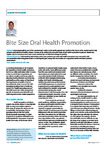Quality after the QOF? Before dismantling it, we need a redefined measure of ‘quality’
Date
2018-07Author
Subject
Metadata
Show full item recordAbstract
The Quality and Outcomes Framework (QOF) for UK general practice is one of the largest health-related pay-for-performance (P4P) schemes in the world. In 2004, the scheme initially had a positive impact on quality of care, primarily achieved via establishment of procedural baselines in the clinical management of incentivised (mostly chronic) diseases. It reduced between-practice variation in care delivery while also improving disease registers, recording of clinical activities, and adoption of electronic medical record systems, leading to an explosion in general practice data and research. Despite some successes, recent years have seen accelerated debate concerning the removal of QOF. One major criticism is that QOF does not incentivise person-centred care for people with complex conditions, who require individualised support. This is not captured in the vast majority of indicators, which are based on clinical guidelines. For example, continuity of care — a critical function of primary care — is valued by patients and associated with improved experience, outcomes, adherence, and preventive medicine, and it may be associated with reduced hospital admissions, death rates, and cost of secondary care/hospitalisation. It can be considered a marker of a holistic approach, which is considered essential for the increasing numbers of people with multimorbidity and complex healthcare needs. Yet it is currently in decline, was reduced after the introduction of QOF,7 and is not being captured by QOF.
Collections
Publisher
Place of Publication
Journal
Volume
Issue
Pagination
Publisher URL
Number
Recommended, similar items
The following license files are associated with this item:
Related items
Showing items related by title, author, creator and subject.
-
Bite Size Oral Health Promotion
Witton, Robert (Mark Allen GroupEngland, 2010-07-02)<jats:p> Improving health is part of the Government's wider public health agenda and central to this theme is the requirement to help patients make informed healthy choices. The aim of the article is to review the basis ... -
A Systematic Review and Meta-analysis of Polycystic Ovary Syndrome and Mental Health among Black Asian Minority Ethnic populations
Delanerolle, G; Ayis, S; Barzilova, V; Phiri, P; Zeng, Y; Ranaweera, S; Shetty, A; Haque, N; Kar, D; Majumder, K; Rathod, S; Raymont, V; Shi, JQ; Hapangama, DK (2022-03-07) -
Message Journal, Issue 5: COVID-19 SPECIAL ISSUE Capturing visual insights, thoughts and reflections on 2020/21 and beyond...
Multiple authors; Abdisalam, Sadia; Alexander, James; Evans, Carole; Ayling, Tom; Barness, Jessica; Bîrhală, Diana; Borțoi, Maria; Canniffe, Bernard J.; Capaldi, Patti; Cardoso, Tânia A.; Class Action Collective; Culliford, Megan; Cunningham, Stephanie; Davies, Meg; Dey, Subir; Frame, Matthew; Ganci, Aaron; Gibbons, Peter; Gvozdeva, Sofija; Herrmann, Elizabeth; Lee, Chae Ho; Hoffmann, Alma; Kamaruzzaman, Hedzlynn; Karp, Merle; Kaufman-Hill, Holly K.; Kilburn, John; Korenblat, Joshua; Lehrer, Warren; Lewis, Erica V. P.; Lhowe, Christine; Li, Xinyi; Salchow Macarthur, Kelly; Mayers, Shelly; McCarthy, Steven; Milea, Bianca; Nesteruk, Sara; Normoyle, Cat; Teague, Jessica; Nini, Paul; Osborne, Emily; Shefrin, Sima Elizabeth; Shim, Kyuha; Sibrian, Angelica; Sinni, Gianni; Sgarro, Irene; Smart, David; Soar, Matt; Tang, Junie; Tegtmeyer, Rebecca; Thon Knutsen, Ane; Thomas, Isobel; Westley, Darryl; Winstanley, Lisa; Woo, Danne; Wood, Dave; Gregory, Helena; Raeburn, Colin; Malcolm, Jackie (University of Plymouth, 2022-02)If there is a theme running through the Message Covid-19 special issue, it is one of caring. Of our own and others’ resilience and wellbeing, of friendship and community, of students, practitioners and their futures, of ...




